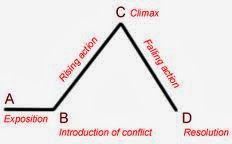"Lost in the Funhouse," is more than just a story; it is a lesson in how to write a story. Take Barth's description of a diagram called Freitag's Triangle (repetition of words in the description, not mine):
While there is no reason to regard this pattern as an absolute necessity, like many other conventions it became conventional because great numbers of people over many years learned by trial and error that it was effective; one ought not to forsake it, therefore, unless one wishes to forsake as well the effect of drama or has clear cause to feel that deliberate violation of the "normal" pattern can better can better effect that effect. ...
There is also a pattern of introducing government funding bills through Congress that has worked for over two hundred years. But House Speaker John Boehner has forsaken that pattern. Instead, he has introduced a bill to fund the government – and to defund the Affordable Care Act of 2010, President Obama's signature healthcare legislation.
House Speaker Boehner has the Constitution on his side. Article 1, Section 7 states,
"All bills for raising Revenue shall originate in the House of Representatives. ..."
And he has the words of James Madison on his side. In The Federalist No. 58, Madison wrote:
...The House of Representatives cannot only refuse, but they alone can propose the supplies requisite for the support of government. They, in a word, hold the purse. ... This power over the purse may, in fact, be regarded as the most complete and effectual weapon with which any constitution can arm the immediate representatives of the people, for obtaining a redress of every grievance, and for carrying into effect every just and salutary measure.You will see those words of Madison on numerous right wing websites, from the Heritage Organization, to the New American, to Freedom First.
What you will not see on those websites are Madison's words in the very next paragraph of The Federalist No. 58:
Those who represent the dignity of their country in the eyes of other nations will be particularly sensible to every prospect of public danger, or of dishonorable stagnation in public affairs. ...For over two hundred years, lawmakers have debated their differing political views in the House and in the Senate. And in many a lawmaker's mind, it was "Country first." But when put to a vote, majority ruled.
Until now.
Here's an Oct. 04, 2013 excerpt from the Huffington Post website:
As the U.S. shutdown continues, national monuments and parks remain closed, hundreds of thousands of American workers go without pay, and federally funded social services for millions of women and children have ceased operating. Abroad, the world is caught between laughter and confusion as a superpower is paralyzed by its inability to overcome a relentless minority of lawmakers who have put the entire government on the line to defund a health care law passed by Congress, signed by the President, and upheld by the Supreme Court. America's political meltdown, an international embarrassment, has compromised the country's global image and credibility.
The Tea Party is "the relentless minority" mentioned in the article above. It is a minority faction of the Republican Party. Yet Boehner has allowed the Tea Party to be the controlling voice of the entire Republican Party.
James Madison defines a "faction" in The Federalist No. 10:
By a faction, I understand a number of citizens, whether amounting to a majority or minority of the whole, who are united and actuated by some common impulse of passion, or of interest, adverse to the rights of other citizens, or to the permanent and aggregate interests of the community.
In the same Federalist number, Madison provides the means to defeat the attempts of a faction, a means House Speaker Boehner thus far refuses to undertake:
If a faction consists of less than a majority, relief is supplied by the republican principle, which enables the majority to defeat the sinister views by regular vote. It may clog the administration, it may convulse the society; but it will be unable to execute and mask its violence under the forms of the Constitution.
If House Speaker Boehner continues to decline to put "a clean CR" to a vote, Democrats are already working on a parliamentary procedure to "hijack a bill," and put the clean continuing resolution to fund the government to a vote before the House. The Democrats want the vote because they believe the majority of Republicans believe in "Country first."
Such a vote could occur only days before the next crisis: raising the debt ceiling. House Speaker Boehner has already said he will not schedule a vote to raise the debt ceiling unless there are negotiations beforehand with the President of the United States. And President Obama has reiterated that he will not negotiate the debt ceiling. Moreover, President Obama does not believe he has the constitutional authority to invoke the Fourteenth Amendment to prevent the United States government from defaulting on its debt.
No one is blinking. If House Speaker Boehner blinks, he will lose his speakership. If President Obama blinks, he will not only lose his signature legislation, he will open the door to future demands for concessions.
If all else fails, and the government is on the brink of defaulting, there is one other alternative, but one that wiser minds than mine need to explore: a writ of mandamus against House Speaker Boehner, compelling him to schedule a vote on raising the debt ceiling. Such an action would enable the House of Representatives to fulfill its ministerial duty to pay our debts, as required by the Constitution.
still lost in the
